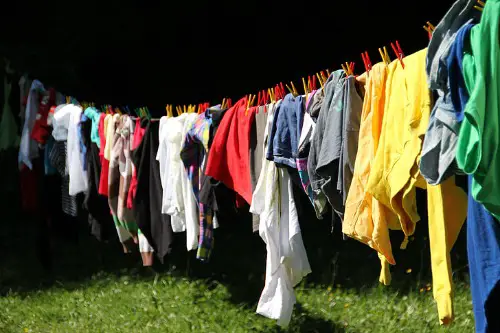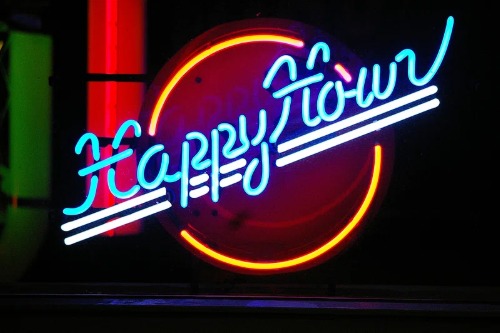1. New York Tried to Ban Flavored Popcorn

In 2011, New York attempted to crack down on flavored popcorn as part of a broader health initiative. Lawmakers cited concerns about obesity and targeted sugary and cheesy varieties often sold in movie theaters. The idea was to limit access to snacks deemed unnecessarily unhealthy, according to Jesse McKinley of The New York Times. However, the move struck a nerve with both consumers and business owners.
Public backlash was swift, with many arguing that flavored popcorn was a harmless indulgence. Critics pointed out that far worse foods were still widely available, making the ban feel arbitrary. The proposal quickly lost steam and was abandoned before becoming law. In the end, the ban popped under pressure, and flavored popcorn stayed on the menu.
2. Vermont Tried to Ban Clotheslines

Some Vermont homeowners’ associations in the 2000s tried to eliminate clotheslines, claiming they ruined neighborhood aesthetics, according to Tom Geoghegan from the BBC. They viewed air-drying laundry as outdated and unsightly, pushing residents to use electric dryers instead. Environmental advocates immediately protested the proposed ban, arguing it penalized people trying to save energy. It sparked a statewide conversation about sustainability and personal rights.
The movement gained enough support that Vermont passed the “Right to Dry” law, blocking HOAs from enforcing such bans. Lawmakers recognized that convenience and eco-friendliness should not be sacrificed for appearances. The law effectively protected air-drying as a green alternative. In the end, fresh laundry and fresh air won the day.
3. California Tried to Ban Plastic Straws—With Jail Time

In 2018, California introduced a bill targeting single-use plastic straws in restaurants, according to ABC News. The early version included the possibility of jail time for servers who handed out straws without customers specifically asking. Although the goal was environmental protection, the punishment seemed disproportionately harsh. Public reaction was overwhelmingly negative, focusing on the absurdity of criminalizing customer service.
The law was eventually revised, removing the jail-time clause and replacing it with modest fines. Restaurants adjusted by switching to paper or reusable straws, and compliance became largely voluntary. The final version encouraged sustainability without treating workers like criminals. California kept its green message, but softened its delivery.
4. Tennessee Tried to Ban Sharing Netflix Passwords

Tennessee legislators passed a law in 2011 aimed at curbing digital piracy and password sharing, according to Ellis Hamburger from Business Insider. The statute, originally targeting organized operations that resold streaming credentials, ended up being written so broadly that even casual account sharing was at risk. Many people were surprised to learn that sharing your Netflix login with a friend could technically be a crime. The vagueness of the law stirred confusion and criticism.
Despite its passage, enforcement has been practically nonexistent, and password sharing continues. Critics argued the law failed to distinguish between commercial abuse and common behavior. Most streaming companies focused on setting their own limits rather than pursuing legal action. The ban became more symbolic than functional, quietly fading into obscurity.
5. Arizona Tried to Ban Nudity in Your Own Home

Arizona once proposed a bill that made it illegal to be naked in your own home if someone outside could see you. The law was originally meant to prevent indecent exposure, but the vague wording left room for punishing innocent behavior. Walking past a window after a shower or changing clothes near open blinds could technically result in a fine or arrest. The public saw it as a major invasion of privacy.
Citizens and advocacy groups pushed back, arguing that people shouldn’t be penalized for unintentional visibility inside their own residences. Critics also pointed out the unfairness of such a rule in a state known for its extreme heat. The bill never passed, and lawmakers quietly backed away from the controversy. In the end, personal freedom—and common sense—prevailed.
6. Florida Tried to Ban Saggy Pants

Several Florida cities attempted to outlaw saggy pants, claiming they represented moral decay and public indecency. These local ordinances often targeted younger people, particularly Black youth, and carried fines or community service penalties. The laws sparked national debate over dress codes and racial profiling. Many argued that fashion should not be criminalized.
Over time, lawsuits and public backlash led to several of these bans being overturned or rendered unenforceable. Courts warned that the laws could violate constitutional rights related to free expression. Still, a few cities kept the ordinances on the books, though enforcement has waned. In practice, the saggy pants crackdown lost its grip.
7. Alabama Tried to Ban S** Toys

Alabama still has one of the strictest laws banning the sale of adult toys, dating back to a 1998 morality law. The regulation only allows the sale of these items for “medical” or “scientific” purposes, requiring sellers to use creative labeling to stay legal. Retailers began calling them “novelty items” or “educational tools” to avoid prosecution. The whole situation quickly became both absurd and contentious.
The law has survived several court challenges, despite being overturned in other states. Critics argue it’s a violation of personal privacy and bodily autonomy. While technically still in effect, enforcement is rare, and adult stores continue to operate through legal gray areas. The ban remains a stubborn relic of outdated thinking that fails to actually ban anything.
8. Texas Tried to Ban Weird Baby Names

Texas once enforced naming rules that prevented parents from using certain symbols or names deemed too unconventional. The state registrar could reject names that included numbers, special characters, or anything considered obscene. While not a blanket ban on creativity, the law often forced parents to choose a different name. Names like “Baby@Love” or “3rdSun” were among those blocked.
Critics of the policy claimed it was too subjective and infringed on personal rights. Though some parents appealed, most ended up compromising. Texas has since relaxed some restrictions but still doesn’t allow special characters in official names. The state’s attempts to regulate identity met resistance, and individuality mostly won out.
9. Oregon Tried to Ban Self-Serve Gas

For decades, Oregon drivers were not allowed to pump their own gas, a policy rooted in job protection and safety claims. The rule made Oregon one of only two states with a full-service gas mandate, confusing out-of-state drivers. As the rest of the country normalized self-service, the law began to feel outdated and inconvenient. Rural areas began pushing for exceptions due to labor shortages.
In 2023, the state finally relaxed the ban and allowed self-service statewide. Critics had long argued that the ban solved a problem that didn’t exist. Many Oregonians were ready for change, and gas stations adapted quickly. The old rule quietly faded into history, replaced by freedom at the pump.
10. Kentucky Tried to Ban Selling Cold Beer at Grocery Stores

For years, Kentucky grocery stores could sell warm beer—but not cold beer—under a bizarre law meant to discourage immediate consumption. Lawmakers believed that if customers had to chill the beer themselves, they’d be less likely to drink it on impulse. The rule led to confusion, inconvenience, and some strategic shopping trips to liquor stores instead. Many viewed it as a pointless restriction.
In 2017, a court struck down the cold beer ban as irrational and unfair. The ruling opened the door for grocery stores to compete more directly with liquor stores. Consumers celebrated the decision, which aligned beer laws with modern shopping habits. Kentucky’s strange cold beer rule was finally put on ice.
11. Indiana Tried to Ban Pi

In one of the most infamous legislative flops, Indiana lawmakers in 1897 introduced a bill to redefine the mathematical constant pi. The bill attempted to set pi to 3.2 based on a misunderstood mathematical paper, claiming it would simplify calculations. Mathematicians immediately pushed back, warning that such a change would violate the laws of nature. Legislating math, they said, was a dangerous precedent.
Thankfully, a math professor intervened during the legislative process and convinced the Senate to kill the bill. Had it passed, Indiana would have become a laughingstock among scientists and educators. Today, the story lives on as a legendary example of legislative overreach. It’s a math joke that continues to teach a serious lesson.
12. Missouri Tried to Ban Firefighters from Protesting

In one of the most infamous legislative flops, Indiana lawmakers in 1897 introduced a bill to redefine the mathematical constant pi. The bill attempted to set pi to 3.2 based on a misunderstood mathematical paper, claiming it would simplify calculations. Mathematicians immediately pushed back, warning that such a change would violate the laws of nature. Legislating math, they said, was a dangerous precedent.
Thankfully, a math professor intervened during the legislative process and convinced the Senate to kill the bill. Had it passed, Indiana would have become a laughingstock among scientists and educators. Today, the story lives on as a legendary example of legislative overreach. It’s a math joke that continues to teach a serious lesson.
13. North Carolina Tried to Ban Happy Hour

North Carolina’s long-standing ban on happy hour prohibits bars from offering time-based drink discounts. The law was intended to reduce alcohol abuse and drunk driving, but critics argue it simply penalizes social drinkers and local businesses. Restaurants can offer drink specials—but only if they’re all-day prices, not limited to specific hours. This means no half-off cocktails after work or beer deals during games.
Many business owners say the ban cuts into profits and makes it harder to attract weekday customers. Residents, too, see it as outdated, especially since most other states have no such restriction. Despite repeated pushes for reform, the law remains in place. For now, happy hour in North Carolina stays stuck in time.
14. Wisconsin Tried to Ban Butter Alternatives

Wisconsin once had one of the strangest food laws in the U.S., banning margarine in public institutions to protect the dairy industry. Restaurants had to ask if patrons preferred margarine, and schools, hospitals, and prisons were restricted from serving it altogether. The law was passed during a time of fierce competition between butter and margarine producers. But for many residents, it became a symbol of government overreach.
Over time, federal regulations and public opinion softened the law’s harshest parts. While margarine is no longer illegal, some institutional restrictions still linger. Wisconsin’s identity as “America’s Dairyland” plays a big role in maintaining the state’s pro-butter stance. Today, the margarine ban is mostly a historical oddity—but one that lasted far longer than most expected.


